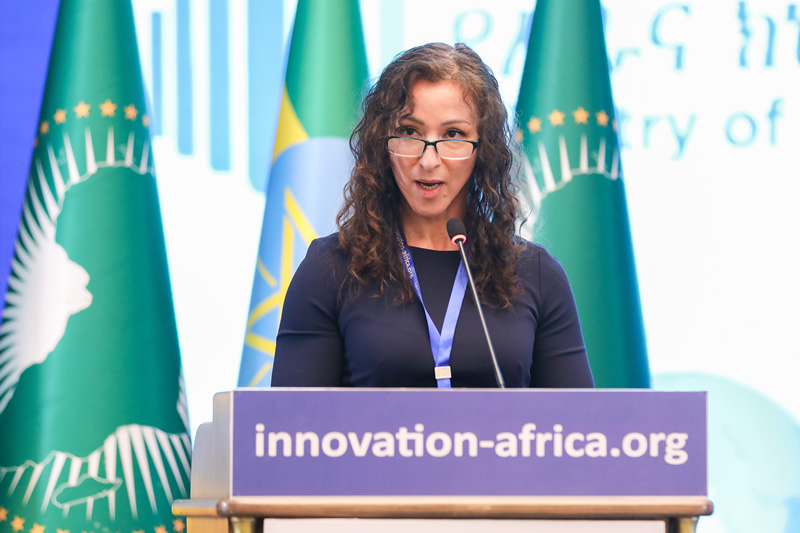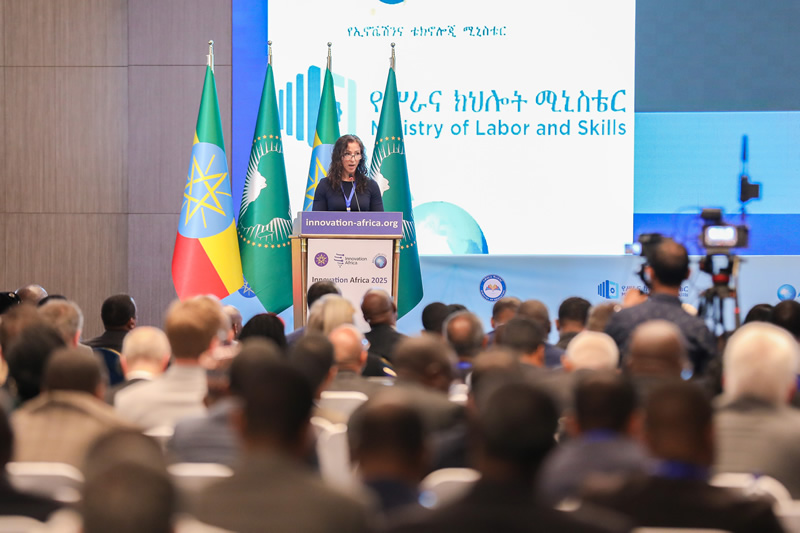CEHD Dean Guerra-López Outlines Bold Vision for Transforming Africa’s Future Workforce Through K–12 Education at “Innovation Africa 2025” Summit
May 7, 2025
In front of ministers, ambassadors, educators, and global innovation leaders, Ingrid Guerra-López, Dean of George Mason University’s College of Education and Human Development (CEHD), delivered a keynote address that called for a bold, system-wide transformation of K–12 education to secure Africa’s workforce future—and the world’s.
Held in Addis Ababa, Ethiopia, the “Innovation Africa 2025” summit convened senior policymakers and international partners to tackle the most pressing challenges in education and skills development across the continent. The event featured opening remarks from HE Temesgen Tiruneh, Deputy Prime Minister of Ethiopia; HE Professor Berhanu Nega, Ethiopia’s Federal Minister of Education; and HE Darren Welch, UK Ambassador to Ethiopia and Permanent Representative to the African Union. Guerra-López emphasized that education is not simply one among many priorities in development—it is the foundation upon which all others rest.

Dean Ingrid Guerra-López at the “Innovation Africa 2025” Summit.
“Africa’s future is already in motion,” she said. “It’s sitting in today’s classrooms. The one billion young people who will shape the continent’s future are learning—or trying to learn—right now. And what happens in those classrooms will determine the future of economies, democracies, and entire regions.”
With this sense of urgency and opportunity, Guerra-López proposed a six-pillar framework to guide education system transformation. As a trained systems thinker with a scholarly background in instructional systems design and performance improvement, she emphasized that meaningful and sustainable change requires a coherent, integrated response—one that bridges workforce development, teacher preparation, digital learning, access for all learners, and alignment with long-term economic opportunity.
“Too often we treat education reform as a series of disconnected efforts—fixing curriculum here, training teachers there, or piloting tech solutions in isolation. But the truth is, systems only improve when the elements are aligned and mutually reinforcing. Strengthening teacher pipelines without modernizing curriculum, for example, won’t yield lasting gains. True transformation requires intervention at the system level,” Guerra-López said.
Her six-pillar framework calls for action in six interconnected areas: strengthening the education workforce, transforming learning through technology and innovation, expanding access and opportunity to all learners, aligning education with economic opportunity, equipping learners with future-ready skills, and building global and regional partnerships to scale what works. Each pillar supports the others, offering a roadmap for national leaders and development partners seeking to improve education outcomes in both the short and long term.
In discussing workforce development, Guerra-López acknowledged UNESCO estimates that Sub-Saharan Africa will need more than 17 million additional teachers by 2030 just to meet basic education goals. This, she said, presents both a challenge and a powerful opportunity—to professionalize teaching and create lifelong pathways of growth for educators. Similarly, she cautioned against overreliance on devices alone, arguing that educational technology must be embedded in broader digital ecosystems that include training, localized content, and robust infrastructure, in alignment with a clear national EdTech strategy.
One of the most resonant themes of her talk was the role of education in building more just, prosperous, and resilient societies, emphasizing that education systems must intentionally prepare learners for an uncertain future shaped by automation, climate change, and shifting labor markets.
“Future-ready skills aren’t just a buzzword—they are a necessity,” Guerra-López said. “The World Economic Forum and countless global studies make clear that skills such as critical thinking, creativity, digital fluency, and environmental stewardship are the currency of tomorrow’s workforce. These must be embedded early, across all learning pathways—not just as add-ons or electives.”
Equally critical, she noted, is ensuring that education is accessible and effective for all learners. Guerra-López called attention to the persistent disparities in access and outcomes between rural and urban learners, boys and girls, and students with and without disabilities. “Education for all is about more than enrollment. It’s about removing both visible and invisible barriers—so every learner, everywhere, has a genuine opportunity to thrive and contribute meaningfully to their communities and economies.”

Dean Ingrid Guerra-López at the “Innovation Africa 2025” Summit.
Dean Guerra-López’s systems-based approach resonated deeply with the summit’s focus on scalable and sustainable solutions. She stressed that while innovation and investment are essential, national leadership and community ownership must drive change. It is in this spirit that CEHD engages with partners across government agencies, universities, and the private sector—co-creating education strategies that reflect local priorities while drawing on global expertise.
“Transformation doesn’t come from outside. It comes from within—when local leaders, educators, and communities shape solutions that reflect their vision and context. Our role, as education and research partners, is to listen, align, and bring evidenced-based tools and support that enable sustainable progress,” she stated.
In closing, Guerra-López positioned CEHD and George Mason University as not only a hub for innovation, but as a platform, for consequential research that drives measurable progress and meaningful societal impact. She echoed George Mason’s Grand Challenge Initiative, especially the university’s commitment to “advancing 21st-century education for all,” framing this work as both a critical component of sustainable development and a strategic investment in global stability and shared prosperity.
“Africa holds extraordinary promise—not just for the continent, but for the world. If we act boldly and collaboratively, we can unlock that potential—starting in the classroom, where the seeds of every future workforce are planted.”
Dean Guerra-López’s address made clear that global transformation begins with local action—and that George Mason is committed to walking alongside the leaders shaping that future.
